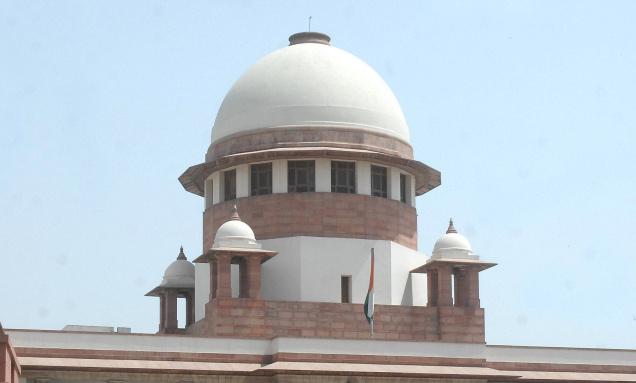INDIAN EXPRESS
New DelhiThe National Green Tribunal, a judicial body that will exclusively deal with environmental issues, is likely to start functioning from May with the Supreme Court lifting a stay imposed by Madras High Court on rules of appointment of its members. The apex court stayed the High Court’s order and directed the Ministry of Environment and Forest (MoEF) to “keep all rules and regulations in place by May 6” and inform the bench about its status, so that the body may start functioning. A bench comprising justices G S Singhvi and A K Ganguly also indicated that even if some deficiencies remain in the rules, the court will pass orders to the effect that petitions may be filed and interim orders may be sought from the green tribunal with immediate effect after May 7.
The bench passed the orders on a petition by MoEF seeking transfer of the case, challenging rules for appointment of members of National Green Tribunal, from Madras High Court to the apex court. The Centre had sought transfer of the case on the ground that the apex court was already hearing a matter related to non-appointment of expert and judicial members for NGT, due to which the only environment appellate body has remained non-functional since it came into existence on October 18, 2010.
The case was initiated in 2005 by environmental activist Vimal Bhai, challenging environment clearance granted for execution of 600 MW Loharinag-Pala hydroelectric power project at Uttarkashi in Uttarakhand. Since then the case is pending due to non-appointment of members for National Environment Appellate Authority (NEAA). With NGT coming into existence, NEAA ceased to exist but the problem of non-appointment of members continued and rendered NGT non-functional. The apex court had on December 16 last year directed the Centre to appoint expert and judicial members for the tribunal and make NGT functional in one month.
However, even as the appointment process was on, the Madras High Court stayed the rules for appointment of judicial members of NGT on a plea by a law student, M Naveen Kumar. Centre then sought transfer of the case from the high court to the Supreme Court.Additional Solicitor General Indra Jaisingh during the previous hearing on Monday informed the court that five judicial and six expert members have been selected and MoEF had also finalised the rules of NGT’s functioning. “If the stay order is vacated, six judicial benches will become operational,” Jaisingh had submitted before the court.
On court’s query on Thursday about the amount of time required to make NGT functional, Jaisingh sought two-week time saying, “The selection (of five judicial members and six experts) are likely to be approved by the Appointment Committee of Cabinet (ACC).” The National Green Tribunal was established on October 18, 2010 with retired Supreme Court judge Justice L S Panta as its chairperson. The tribunal was supposed to have circuit benches across the country but no other member was appointed apart from its chairman. After Australia and New Zealand, India is the third country to have such an institution.
National Green Tribunal (NGT)
The National Green Tribunal has been established on 18.10.2010 under the National Green Tribunal Act 2010 for effective and expeditious disposal of cases relating to environmental protection and conservation of forests and other natural resources including enforcement of any legal right relating to environment and giving relief and compensation for damages to persons and property and for matters connected therewith or incidental thereto. It is a specialized body equipped with the necessary expertise to handle environmental disputes involving multi-disciplinary issues. The Tribunal shall not be bound by the procedure laid down under the Code of Civil Procedure, 1908, but shall be guided by principles of natural justice.
The Tribunal’s dedicated jurisdiction in environmental matters shall provide speedy environmental justice and help reduce the burden of litigation in the higher courts. The Tribunal is mandated to make and endeavour for disposal of applications or appeals finally within 6 months of filing of the same. Initially, the NGT is proposed to be set up at five places of sittings and will follow circuit procedure for making itself more accessible. New Delhi is the Principal Place of Sitting of the Tribunal and Bhopal, Pune, Kolkata and Chennai shall be the other 4 place of sitting of the Tribunal.
THE RELEVANT ACT AND NOTIFICATIONS ISSUED ARE AS UNDER:-
- National Green Tribunal Act, 2010 (No. 19 of 2010).
- Notification dated 18/10/2010 –
- Enforcement of the NGT Act.
- Establishment of “The National Green Tribunal”.
- Appointment of Shri Justice L.S. Panta, Former Judge of the Supreme Court as Chairperson of the NGT.
- Notification dated 26/11/2010, National Green Tribunal (Manner of Appointment of Judicial and Expert Members Salaries, Allowances and other Terms and Conditions of Service of Chairperson and other Members and Procedure for Inquiry) Rules, 2010.
- Notification dated 04/04/2011 – GSR 295 (E) – NGT (Financial and Administrative Powers), Rules, 2011.
-
Notification dated 04/04/2011 GSR No. 296 (E) – NGT (Practice and Procedure) Rules, 2011.
